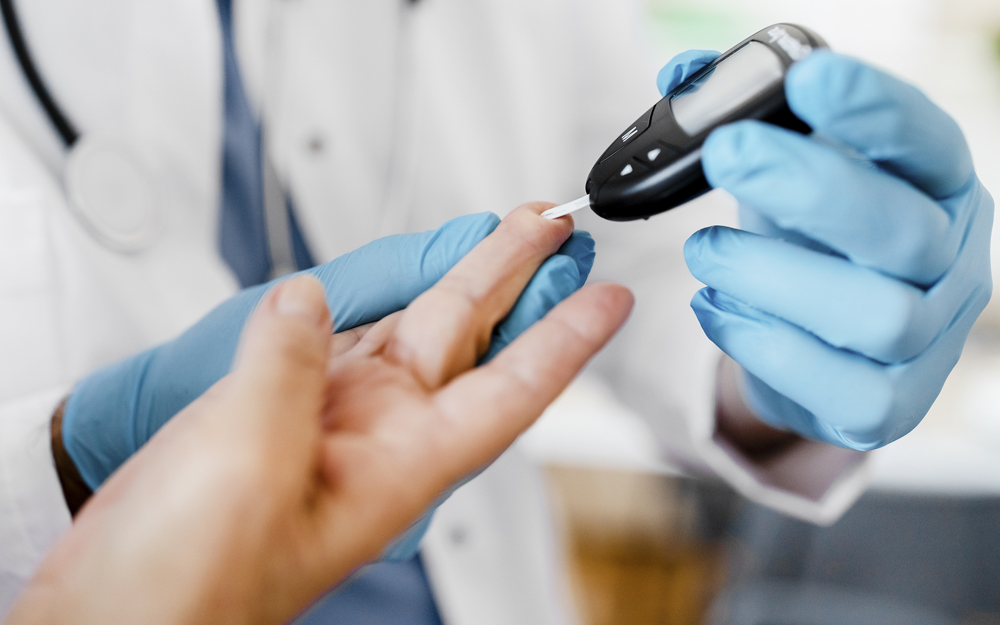The Link Between Pancreatic Cancer and Diabetes
Date
March 13, 2024
Credits

Date
March 13, 2024
Credits
Medical providers featured in this article

In Brief
{{cta-block}}
Pancreatic cancer is an aggressive disease that’s currently on track to become the second deadliest cancer type by 2030, but scientists at Cedars-Sinai hope to intercept that trajectory by uncovering new methods of detecting pancreatic cancer in its earliest stages, starting with metabolism.
“We know that metabolic disease is an independent risk factor for all types of cancer, and there’s longstanding evidence that diabetes and pancreatic cancer are strongly linked,” said Stephen Pandol, MD, director of Basic and Translational Pancreas Research at Cedars-Sinai. “So, it’s possible that new onset of metabolic disease, particularly diabetes, could be the first warning sign of an impending pancreatic cancer diagnosis.”
The Pancreas, Explained
The pancreas is a small, spongy organ nestled in the upper abdomen behind the stomach. It’s about 6 to 10 inches long, shaped like a fish and extends horizontally across the abdomen. The widest part of the pancreas, called the head, sits near the center of the abdomen, where the stomach meets the first part of the small intestine. The thin end of the pancreas extends to the left and is called the tail.
This two-part glandular organ performs two key functions:
- Producing digestive enzymes, which help the body absorb and digest foods
- Making the hormones insulin and glucagon, which regulate blood sugar and fatty acid levels
“When you think about the function of the pancreas, it makes sense that metabolic changes might be the first sign of pancreatic dysfunction—or a growing tumor,” Pandol said.
“Our preliminary research suggests that up to two-thirds of patients with pancreatic cancer already have diabetes or prediabetes when they’re diagnosed. It’s clear that diabetes contributes to both the onset and progression of pancreatic cancer.”
The Metabolic Drivers of Pancreatic Cancer
There are certain risk factors for pancreatic cancer that you can’t change—things like age, Black or Ashkenazi Jewish ancestry, or a strong family history of the disease (two or more first-degree relatives who have had pancreatic cancer). But there are also strong metabolic risk factors for pancreatic cancer, such as obesity, Type 2 diabetes and metabolic syndrome (a cluster of conditions that occur together and increase the risk of heart disease and diabetes)—all of which have skyrocketed in recent decades.
“Our preliminary research suggests that up to two-thirds of patients with pancreatic cancer already have diabetes or prediabetes when they’re diagnosed,” Pandol said. “It’s clear that diabetes contributes to both the onset and progression of pancreatic cancer.”
With Type 2 diabetes, resistance to insulin prompts the pancreas to pump out more and more insulin in an attempt to regulate blood sugar levels. To complicate matters, insulin promotes cell growth, which creates a sort of negative feedback loop that fuels the growth of cancer cells. So, in a sense, diabetes is both a cause and consequence of pancreatic cancer.
Scientists aren’t yet clear about which comes first: diabetes or a cancerous tumor that compromises pancreatic function. But they know that blood sugar changes play a role in the growth of pancreatic cancer, and studies show that the diabetes drug metformin, which helps control blood sugar levels, may also improve survival odds for people with pancreatic cancer.
Who Is at Risk for Diabetes-Linked Pancreatic Cancer?
It’s important to remember that pancreatic cancer is still rare, representing only about 3% of cancers. Also, only about 1% of people who have diabetes will develop pancreatic cancer. Still, it’s important to be aware of the link, particularly if you fall into one of the following categories:
- You’ve been newly diagnosed with diabetes after age 50. This form of diabetes, called new-onset diabetes, is associated with an eightfold increased risk of developing pancreatic cancer compared to people who don’t have diabetes.
- You’ve had diabetes for more than five years. People who fall into this risk group are about two times more likely to develop pancreatic cancer than people without diabetes.
- You are Black or Latin, which are associated with a higher risk of both diabetes and pancreatic cancer.
- You have a form of diabetes called Type 3c, which indicates a problem with the pancreas, such as a tumor. With Type 3c diabetes, problems with blood sugar control may be an early sign of pancreatic cancer. Type 3c diabetes often causes weight loss, while Type 2 diabetes is typically associated with weight gain.





